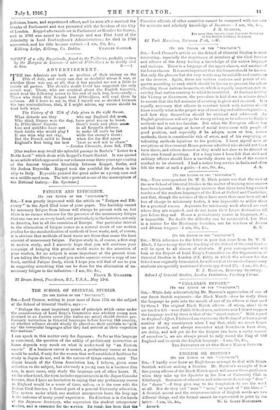[TO THE EDITOR OF TEl " SPECTATOR.,
Sin,—Lord Cromer's article on the School of Oriental Studies is most interesting, especially the importance of members el the Civil Service and officers of the Army having a knowledge of the native language and customs. There is a language of the upper classes, and another of the lower classes. It is most important that the former should be known. Not only the phrases but the very words may be suitable and courteous or the reverse. Again, there are various customs and points of eti- quette according to rank which should be known to prevent the officer offending those natives he meets, or, which is equally important, not re- ceiving that native courtesy to Is hich ho is entitled. At Durbars held by the Viceroy or Governors, tho procedure is laid down in minute detail to ensure that the full measure of courtesy is given and received. It is equally necessary that officers in constant touch with natives elesuld know exactly what is the proper way of receiving and addressing natiN ; s, and how they themselves should be received and addressed. An English gentleman will not go far wrong so lung as he adheres to Englista methods and is not too familiar. But when the European officer has not had the advantage at home of social intercourse with people of good position, and especially if he adopts, more or loss, native methods, there is considerable risk of error, and of his employing or tolerating methods injurious to his position. I have myself soon at receptions at Government House persons admitted who should not have been there, and others dressed as they would not dare to be dressed at their own formal meetings. For a long time I have felt that civil and military officers should have a carefully drawn up code of the correct conduct to be observed. I had a rather long service in India and often
felt the want of such a guido.—I am, Sir, &o., J. A.










































 Previous page
Previous page